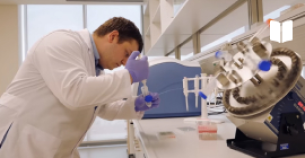The Department of Medical Biochemistry offers various undergraduate and associate degree courses in the Faculty of Health Sciences (Nursing, Physiotherapy and Rehabilitation), the Vocational School of Health Services (Medical Laboratory Techniques Program, Dialysis Program) as well as biochemistry courses taught at the School of Medicine.
The Department of Medical Biochemistry offers a master's program (since 2011) and a Ph.D. program (since 2011) with Biochemistry and Molecular Biology thesis in collaboration with the Department of Medical Biology, and in association with the Institute of Health Sciences.
The mission of these programs is to provide support for young people to become internationally qualified scientists in their field by emphasizing the scientific spirit and encouraging them to think, ask questions and generate ideas while bound by the spirit of strong teamwork.
For this purpose, joint research and scientific collaboration is ongoing with many countries including the US, Germany, Switzerland, Austria and Luxembourg. The research topics of the medical biochemistry department can be summarized as follows; thyroid health, brain tumor research, cancer biomarkers, protein and small molecule design and characterization, antifreeze proteins, protein adsorption and modelling, system design for functionally active GPCR production and detection, ion-exchange columns and modeling, method development / validation, and production information for technology and laboratory statistics quality control and quality assessment, accreditation, laboratory management, neonatal metabolic diseases, rarely performed laboratory tests, development of organ and cell protection solutions, and proteomic analysis of mother and cow’s milk.
The academic staff of the Department of Medical Biochemistry have scientific collaborations with many domestic / foreign university / scientific associations / research centers including the Center of Diseases Control and Prevention (CDC), Cleveland State University, the University of Potsdam, the University of Zurich (ETH), the University of Vienna, Center de Recherche - Gabriel Lippmann, the Proteomics Association, the European Proteomics Association (EuPA), and the Human Proteome Organization (HUPO).


